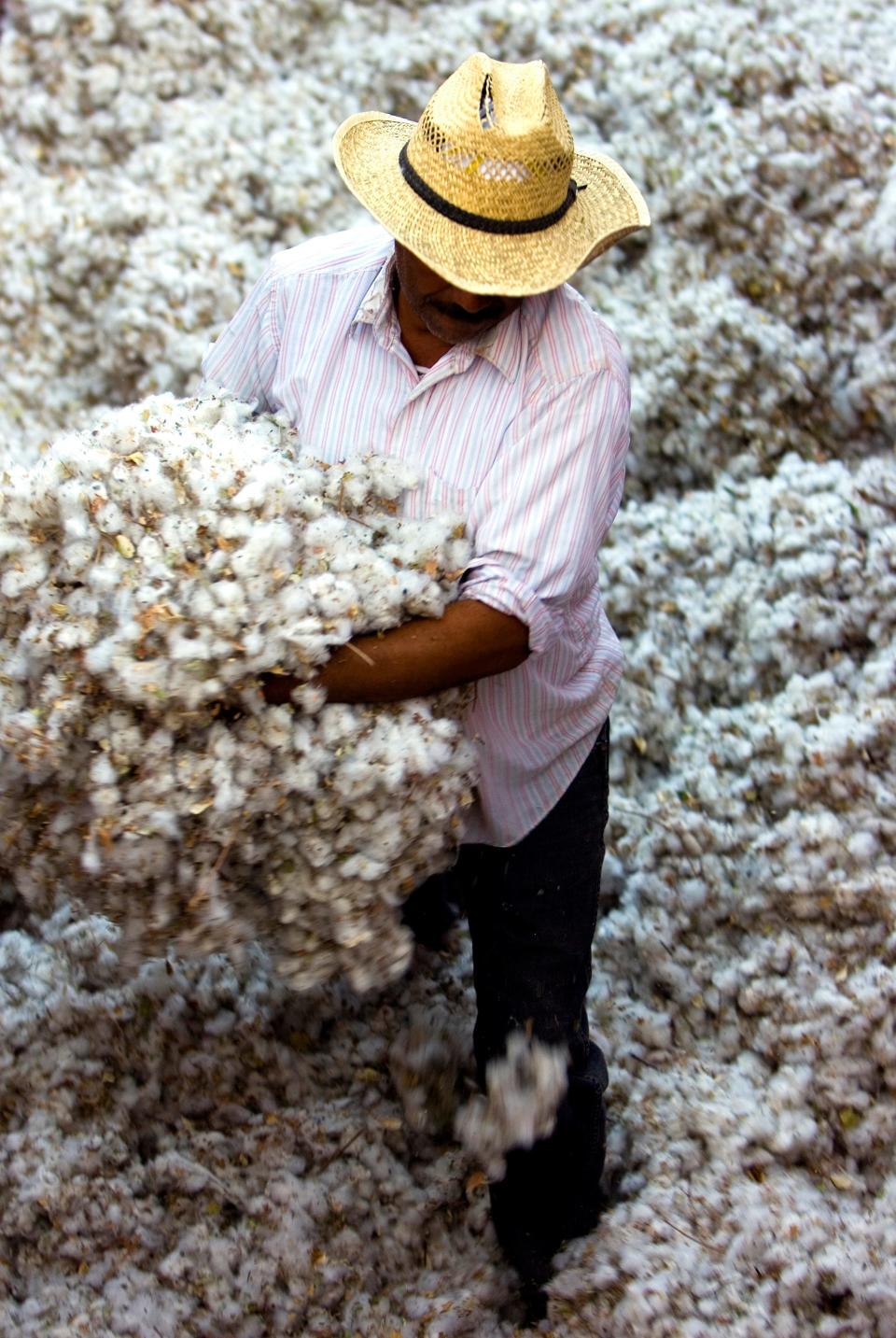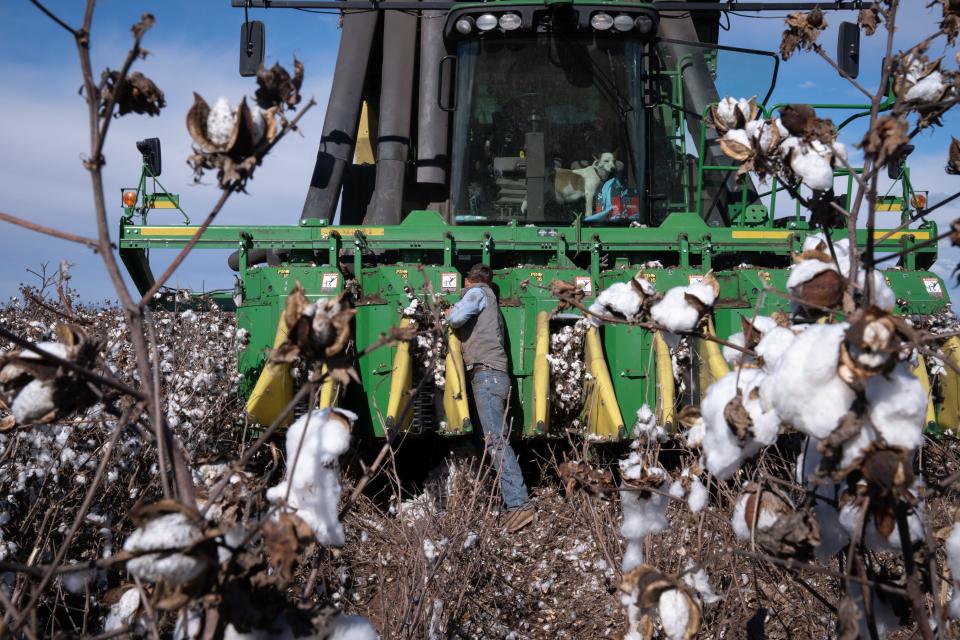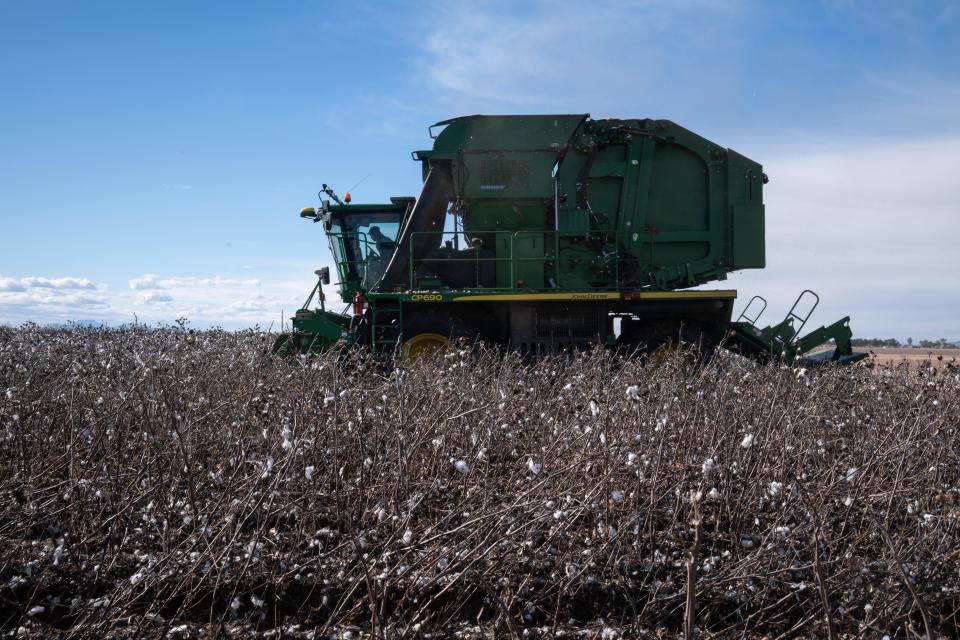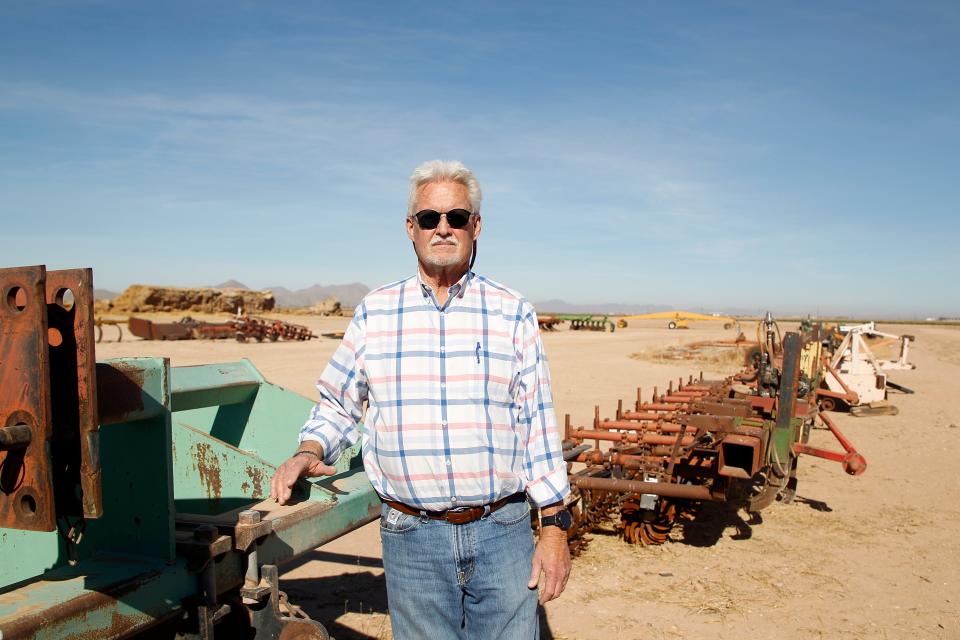A weed killer popular among Arizona cotton growers could be off limits after court ruling
A popular weed killer used on genetically modified cotton and soybeans could be off limits for 2024, a move that could raise already high costs for growers in Arizona.
A federal court in Arizona ruled Tuesday that the Environmental Protection Agency violated notice-and-comment rules when it reauthorized dicamba products in 2020, and, for the second time, revoked the registration of the herbicide.
The ruling by the U.S. District Court in Tucson could make the use of the product illegal. EPA registration is mandatory for all pesticides under the Federal Insecticide, Fungicide, and Rodenticide Act.
The ruling is based on a failed procedure, but a 2020 ruling said EPA violated a federal statute regulating pesticides in six ways.

Many products contain dicamba. Those affected by the ruling are XtendiMax by Bayer, Engenia by BASF, and Tavium by Syngenta, which are used on cotton and soybean crops and are effective in controlling weeds already resistant to glyphosate, a $2 billion problem for U.S. agriculture. At least 30 million acres of farmland across the U.S. are sprayed with the products every year, according to EPA records.
"This is something that could be very devastating to the cotton industry," said Jadee Rohner, executive director of the Arizona Cotton Growers Association.
"Cotton growers already have very high production costs and if they are forced to buy new seeds and chemicals, it's going to increase their already high costs."
Chemical companies sell dicamba and dicamba-resistant cotton and soybean seeds so growers can spray crops.
In Arizona, between 2018 and 2021, about 74% of all cotton crop acres were planted with dicamba-resistant seeds, Rohner said. While not all farmers spray the herbicide on their crops, they often stock up on both products ahead of the planting season.
Without the products, farmers will be left with less effective and more costly options.
The timing of the ruling is concerning because it comes just ahead of the planting season, and "leaves producers in a very weak position for 2024," Rohner said. Growers in Yuma County often start planting as early as late February.
The EPA has still not announced whether it will allow the use of existing stock, products that are already on retail store shelves and farmers' warehouses.

Dicamba's collateral damage
Dicamba was first registered in the 1960s but it didn't become popular until a couple of years ago.
It's part of a group of herbicides that mimic plant hormones, and it specifically targets broad-leaf plants. It doesn't affect grasses, so it can be used in turf and forage crops to eliminate other weeds.
Farmers growing cotton and soybean, both broad-leaf crops, couldn't use the product directly at first. They applied it to the ground before the planting season and its use was minimal. The herbicide tends to drift and become volatile, so there was big risk they'd damage nearby crops.
But in 2015, Monsanto, which is now part of Bayer, developed genetically engineered crop varieties that could resist dicamba and decreased its volatility. Dicamba use skyrocketed. The next year, EPA approved over-the-top use of the weed killer.
The approval was controversial and followed immediately by lawsuits, some by environmental organizations and thousands more by farmers making crop damage complaints.
Dicamba has been extremely helpful for many cotton, corn and soybean growers to keep weeds at bay and increase yields. But its use has also caused harm to other farmers, beekeepers and native vegetation, particularly in the east and midwest.

In 2021, there were 3,400 drift incidents and 1 million acres damaged across the country, according to the EPA.
A lot of incidents are related to misuse and not following the herbicide label instructions when spraying.
But the herbicide can move to nearby crops, even when used correctly. Volatility, even if reduced in new products, means droplets can go from liquid to vapor and travel on the wind, even after spraying.
The product can evaporate under many circumstances that are not in the hands of growers, such as changes in temperature, atmospheric pressure, humidity and wind.
What about drift in Arizona?
Most of the drift damage has occurred in soybean crops, which are prominent in the east. This is because soybeans are "extremely sensitive to dicamba," said Ken Narramore, president of the Arizona Crop Protection Association.
Narramore and Rohner, of the Cotton Growers Association, said they know of no drift incidents in Arizona. There are also no soybean plantations in the state.

"The ruling, which happened to be in Arizona, affected the entire country," said Narramore. "But as far as any (drift) impact on Arizona crops, dicamba is not an issue."
Dicamba is also applied other crops, and even by the National Park Service to control invasive plants, but its usage remains low or moderate, according to the Arizona Pest Management Center.
Labels for the three products that were revoked by courts include numerous restrictions because of how easily they can turn to vapor and drift. Anyone who applies the product has to be licensed.
"We have PCAs (pest control advisers) that are very diligent in following those labels," Rohner said. "Being a good neighbor is an extremely important trait for producers."
Arizona growers use dicamba products to control herbicide-resistant weeds on about 75,000 acres of cotton. Some growers use ground application of other herbicides and glyphosate, in cases where the weeds haven't become herbicide tolerant.
Not having dicamba could potentially lead to more glyphosate use, said Narramore, or push growers to consider hiring weeding crews, "and that job in that time of year is not the greatest from a worker-safety standpoint."
Plaintiffs call it a victory
EPA registered over-the-top use of dicamba for the first time in 2016, and renewed it in 2018 and 2020. The last re-approval was meant to last until 2025.
All approvals were followed by lawsuits by the National Family Farm Coalition, Pesticide Action Network, Center for Food Safety and the Center for Biological Diversity, which called the latest ruling "a sweeping victory for family farmers and dozens of endangered plants and animals."
There are many formulations of dicamba being used beyond cotton and soybean crops, but the plaintiffs targeted the three over-the-top products because of the damage they've been associated with.
"Once these over-the-top products were registered in 2017, there was an explosion in reports of drift. If you just look at the correlation it's quite clear that these are the products driving the widespread damage," Meredith Stevenson, an attorney with the Center for Food Safety, told The Republic.
The court agreed with this interpretation.
In 2020, the Ninth Circuit Court of Appeals concluded that EPA understated or "entirely failed" to acknowledge risks from dicamba use. The agency also approved the products assuming label instructions would be followed, but evidence showed the restrictions were “difficult if not impossible” to follow, courts said.
Courts revoked registration. But months later, the EPA added new restrictions to the products and approved its use for five more years. Plaintiffs sued again and won.
The National Cotton Council has urged the EPA to appeal the ruling.
Clara Migoya covers agriculture and water issues for The Arizona Republic and azcentral. Send tips or questions to clara.migoya@arizonarepublic.com.
This article originally appeared on Arizona Republic: Use of popular weedkiller Dicamba is revoked by Arizona federal court

